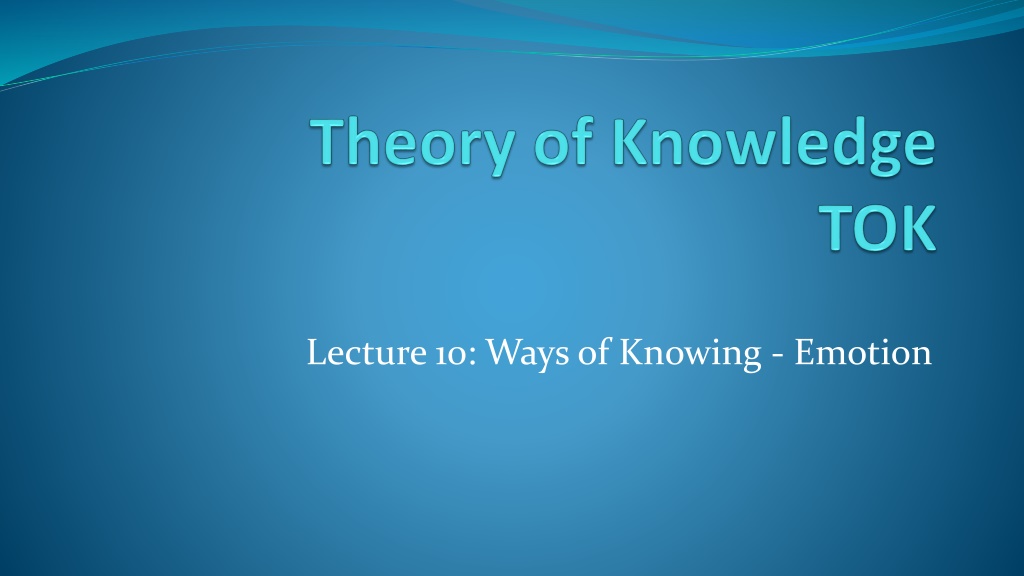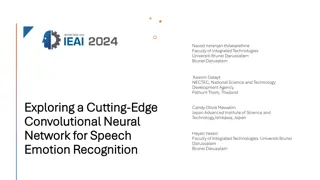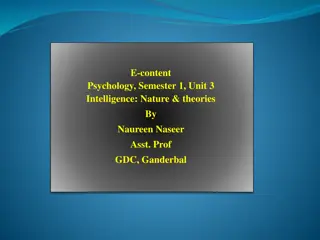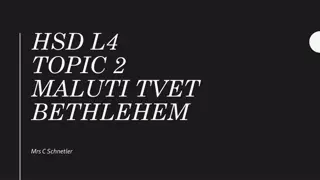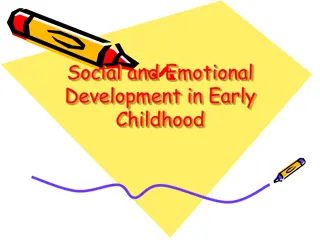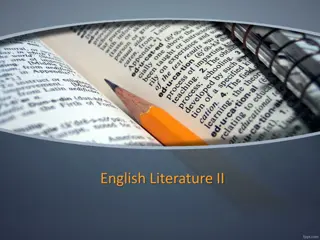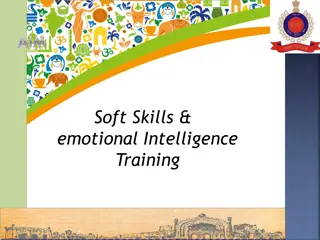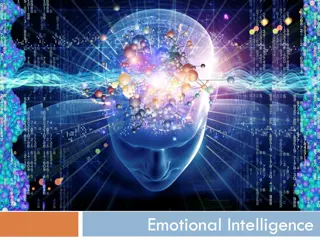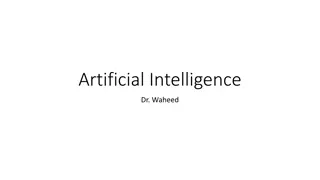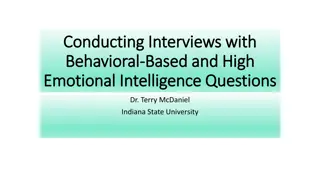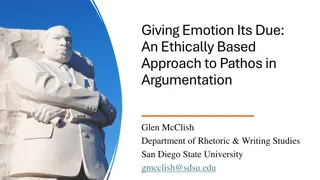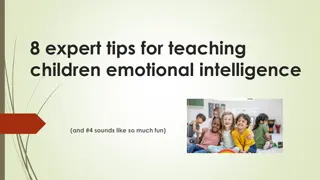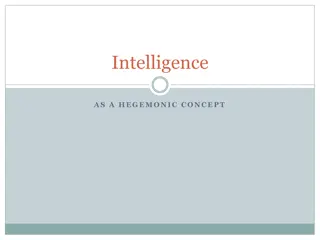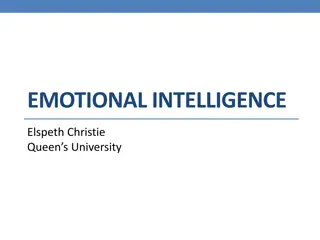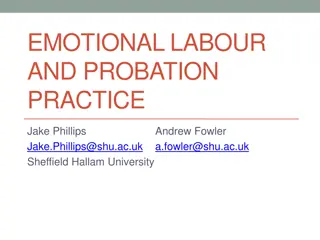Exploring Emotion as a Way of Knowing and Emotional Intelligence
Delve into the concept of emotion as a Way of Knowing (WOK) and the significance of emotional intelligence in acquiring knowledge about our own and others' emotions. Understand the distinction between emotional intelligence and traditional WOKs, and challenge stereotypes regarding emotion's impact on reasoning and decision-making.
Download Presentation

Please find below an Image/Link to download the presentation.
The content on the website is provided AS IS for your information and personal use only. It may not be sold, licensed, or shared on other websites without obtaining consent from the author. Download presentation by click this link. If you encounter any issues during the download, it is possible that the publisher has removed the file from their server.
E N D
Presentation Transcript
Is emotion really a WOK? In your notebook, quickly sketch out a definition of Way of Knowing and a definition of Area of Knowledge. Way of Knowing = a means or method of attaining knowledge. Area of Knowledge = a set of beliefs on a given topic, e.g. our set of belief about biology, history, art-theory, etc. So, is emotion a means or method of attaining knowledge?
Emotional intelligence In any discussion of emotion as a WOK, the idea of emotional intelligence usually comes up pretty quickly. What is emotional intelligence? Is it a special faculty something like a sixth sense via which we gain knowledge of our own and other s emotion?
Emotional intelligence Actually, the psychologists and cognitive scientist who study emotional intelligence do not mean to posit the existence of any sixth sense. What they are talking about is the capacity to acquire two different kinds of knowledge: Knowledge of our own emotions (intrapersonal intelligence) and Knowledge of others emotions (interpersonal intelligence) According to the experts in this area, just as people vary in their logical- mathematical, spatial, or linguistic intelligence (i.e., in their capacity to attain logical-mathematical, spatial, or linguistic knowledge) they also vary in terms of their capacity to acquire knowledge of their own and others emotions.
Emotional intelligence But of course, all of this treats emotion as an AOK, not as a WOK. Our knowledge of emotion is it is assumed acquired via reason, the senses, and language. The idea is just that some people are better than others at using their reason, their senses, and language to acquire knowledge about their own and others emotions.
Emotion: a force opposed to reason Within Western Culture there has been the idea (thankfully, now going out of fashion) that: Women and more emotional than men. And this is why women should not be allowed to hold positions of power. Are women more emotional than men? If they were, would this be a reason to keep them out of positions of power?
Emotion: a force opposed to reason The idea here seems to be that emotions (or at least, very strong emotions) cloud or distort reasoning, or even make reasoning impossible. On this reading, emotion is not a WOK, it s actually a WONK (a way of NOT knowing). So, if emotion distorts reason, does this mean we would we be better off without emotions?
Emotion and reason as complimentary forces Suppose you believe (and perhaps even know) that there is chocolate cake in the fridge. Will this belief alone be enough to get you out of your comfortable chair and into the kitchen? Suppose you believe that there is a vicious animal charging towards you. Will this belief (on its own) be enough to cause you to run?
Emotion and reason as complimentary forces No, in the absence of a desire for cake (which is an emotional state), a belief that there is cake will not get you off the couch. And in the absence of fear (of the vicious animal or of the bodily harm it might cause) a belief that there is a vicious animal charging towards you will not be enough to make you run
Emotion and reason as complimentary forces Reason helps us get closer to the truth/knowledge. And the truths that we uncover through reason and sense often help us to achieve desired practical outcomes. Some of the reasoning in which we engage probably happens automatically. However, much of the reasoning in which we engage is motivated by desires (or by fears). Thus, much of what we now know, we would never have come to know if we were purely logical beings, devoid of emotion.
Reason as a brake on emotion To admit that emotion is what motivates us is in both action and inquiry is not to say that we should simply do whatever our emotions dictate. The fact is that we have conflicting desires, and it is our reason that helps us work out what is the best thing to do to maximize our the overall satisfaction of our desires. For example, you might want cake, but you might also want to lose weight more than you want cake. If you simply followed the dictates of your desired from moment to moment, you would simply eat cake whenever it was presented to you. Reason tells you that in order to achieve the goals that are most important to you you sometimes need to go against your immediate emotional responses.
Back to the question: Is emotion really a way of knowing? We have looked at the idea of emotional intelligence, which treats emotion as an AOK, and asks the question How do we get better at attaining knowledge of or about our emotions? We have looked as emotion as a barrier to the effective use of reasoning (emotion as a WONK ). And we have looked at emotion as a motivator for action and inquiry. But all of this does not answer the question: is emotion a Way of Knowing (a means or method of attaining knowledge?)
Back to the question: Is emotion really a way of knowing? Here are a couple of ideas to think about: Can emotions tell us that a situation or a person - is good or bad before our reason or sense perception brings us to the same conclusion? Can our emotions reveal otherwise undiscovered truths about ourselves? For example, could my feelings of discomfort around people of different cultural background help me realize that I am a racist? Can
Discussion questions for this week Does emotion really make reasoning more difficult? Does it depend on what kind of emotion we are talking about? How would a person who completely lacked emotions behave? Can emotion ever reveal truths that cannot be revealed by reason or the senses?
Journal entry and reading. Journal Topic: Can emotion ever reveal truths that cannot be revealed by reason or the senses? Reading for this week: Nicholas Alchin, Theory of Knowledge, pp. 49-64
